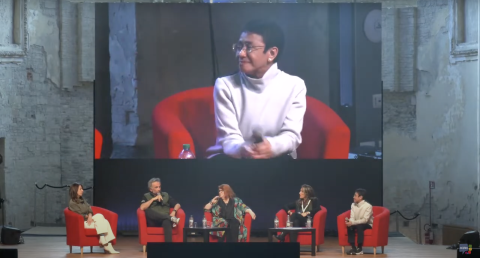“We already can't tell fact from fiction because the first generation of AI in social media didn't actually anchor on facts and [instead] spread lies, fear, anger, hate.”
At a panel during last month's International Journalism Festival in Perugia, Italy, Nobel Laureate Maria Ressa of the Philippines reminded us what’s at stake: AI often facilitates the spread of misinformation and disinformation, advancing authoritarian agendas. The conversation featured Natalia Antelava (Coda Story, Georgia), Branko Brkic (Daily Maverick, South Africa), Patricia Campos Mello (Folha de São Paulo, Brazil) and was moderated by Dr. Julie Posetti of the International Center for Journalists (ICFJ). It aimed not to merely rehash familiar concerns but to share innovative solutions newsroom leaders are employing globally to combat this pervasive issue.

Below are some of the ways in which each of them is responding to the information pollution infiltrating the media ecosystems they operate in:
Ressa and her team at Rappler have created a Matrix Protocol, an end-to-end encrypted chat app that allows for decentralized communications. The app is a “digital town square” connected to Rappler that lets you chat with journalists, civil society groups and other people interested in a particular topic, which you can find via the news site. The Matrix is a response to the insidious online threats journalists, including Ressa herself, have been subjected to.
Antelava practices proactive journalism, investigating how authoritarian regimes exploit tech platforms to spread disinformation and advance their agendas, even in democratic societies. Her goal is to expose the root causes of crises across countries, revealing how governments and platforms "weaponize nostalgia" and leverage local grievances through disinformation campaigns.
Brkic’s job is to ensure the protection of his journalists and he is not taking chances when it comes to assessing which online threats could turn into physical violence. Brkic has made counseling services available for his newsroom; 60% have taken advantage of them over the last four years. He also supports the Daily Maverick’s journalists, particularly female reporters, who experience higher rates of gendered disinformation and online violence, physically relocate to safe houses if needed.
Campos Mello's approach involves dedicated coverage of disinformation, including following the funding sources through monitoring public messaging channels, tracking legislation and lobbying efforts by tech companies and employing accountability journalism to ensure platforms enforce their own rules.
The discussion was tied to ICFJ’s three-year Disarming Disinformation initiative, which equips journalists and community leaders with tools to investigate the sources of disinformation, use new techniques to make truthful information spread virally and research how newsrooms are finding replicable ways to combat the spread of falsehoods. Posetti leads the research part of the project and the four news outlets represented are all participants.
While this dialogue illuminates the pernicious sources and tactics of disinformation eroding journalism, it also showcases the innovative solutions newsroom leaders worldwide are pioneering to combat this persistent scourge. Though such discussions remain crucial in the foreseeable future, the field is teeming with innovative thinkers forging new paths to preserve truth and accountability.
Disarming Disinformation is run by ICFJ with lead funding from the Scripps Howard Fund, which supports The E.W. Scripps Company’s charitable efforts. The three-year project is empowering journalists and journalism students to fight disinformation.